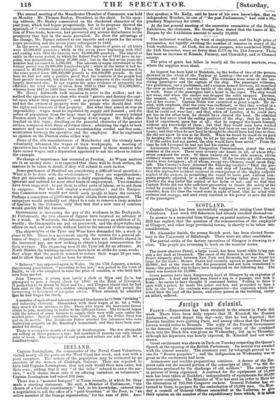IRELAND.
Captain Jerningbam, the commander of the Naval Coast Volunteers, visited nearly all the ports on the West Coast last week, and met with a good reception. The ardour of the population may be estimated by an anecdote of the women of Claddagh, Galway. They are reported to have told Captain Jerningham, that not only would their men enter, but their sons ; adding, that if any "of the tribe" refused to enter the ser- vice, "we'll shame them into it by offering ourselves as volunteers." Captain Jerningham had raised 252 men.
There was a "monster banquet" at Tuam recently, at which Dr. Gray made a startling statement. He said, a Member of Parliament, "the chosen of a Catholic constituency," had, to his knowledge, entered into a negotiation to sell the office of a " paid Guardian" of the Poor, to "an active member of the Orange' organization," for the sum of 3004 Ano- ther speaker, a Mr. Kelly, said he knew of his own knowledge, that an independent Member' in one of "the peat Parliaments," had sold a Sti- pendiary Magistracy for 10004!
At the last general meeting of the executive committee of the Dublin Exhibition, the chairman, Mr. George Roe, stated that the losses of Mr. Dargan by the Lxhibition amount to nearly 20,0004 The inclement weather, the want of employment, and the high price of necessaries, are rapidly swelling the number of inmates in many of the Irish workhouses. At Cork, the in-door paupers, who numbered 328900 the 24th December, were no fewer than 4173 on the 21st January. There has been an increase at Kinsale, Fermoy, and Clonakilty, and in Clonmel county.
The price of grain has fallen in nearly all the country markets, even where the supplies were short.
An inquest has been held at Malahidm on the bodies of two of the persona drowned in the wreck of the Tayleur at Lambay—tbe son of the surgeon Cunningham, and the second mate. The witnesses were some of the sur- viving passengers and the captain of the ship. The passenger witnesses, two gentlemen one a yachtsman and a seaman named Davison, all described the crew as inefficient ; and the tackle of the ship as new, stiff, and difficult to work. Some of the passengers lent a hand to the ropes. The snip would not wear, and when the anchor was dropped the cable snapped. Davison, the seaman, said, '41 can only attribute the catastrophe to the ship being out of her course." Captain Noble was examined at great length. He de- nied, with emphasis, that the crew was inefficient, or that they worked in a Iubberly manner. He asserted that the vessel would not answer her helm ; that he could not wear her ; and that, when off Larnbay, if he could have got her on the other tack, he should have .cleared the land. He admitted that he had never tried the sailing qualities of the ship ; that he made no kind of experiment upon her at all; that he engaged the hands himself, without any knowledge of them ; but that they would soon have worked well together. He admitted that the ship had been on one tack for thirteen hours- and that when he saw land bethought he should have had time to clear. He did not know he was so far North. When he found he could do no good by keeping the sails on the ship, he let go the anchor and the cable broke. "If the cables had not parted, the ship would have been saved." Front the time he left Liverpool he had not had his clothes off. Lieutenant Prior, Assistant Emigration Commissioner, stated the exact number of the crew. There were seventy-one hands in all, of whom fifty- seven composed the crew. Of these twenty-six were able seamen, eleven ordinary seamen, and six were apprentices. Of the twenty-six able seamen, twelve were foreigners; all of whom, except two Chinese,, could speak Eng- lish. The Coroner's Jury returned the following verdict—" That the par- ties were drowned by the sinking of the said ship off Lambay Island ; and that this deplorable accident occurred in consequence of the highly culpable neglect of the owners, in permitting the vessel- to leave port without com- passes properly adjusted, or a sufficient trial having taken place to learn whether she was under the control of her helm or not : and we find that Captain Noble did not take sufficient precaution to insure the safety of the vessel by rounding to after he found the compasses were in error; but we consider, from the time the vessel came in sight of land, that he acted with coolness and courage, and used every exertion in his power to save the lives of the passengers,"


































 Previous page
Previous page